新编英语语法教程第五版1 Sentence Structure
新编英语语法教程第五版课后翻译答案解析
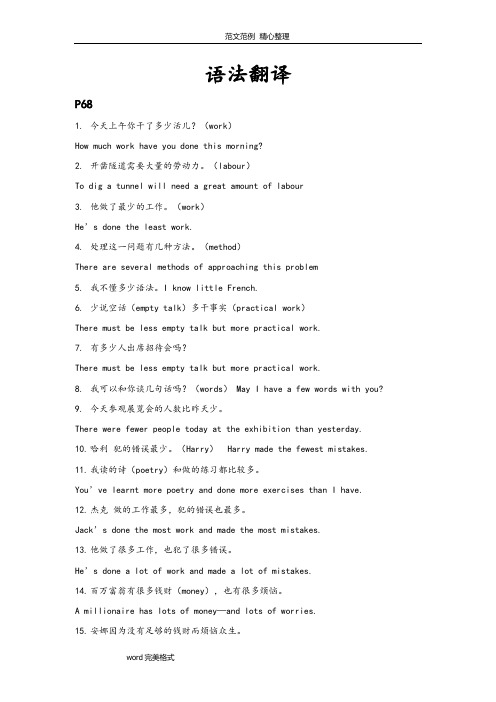
语法翻译P681.今天上午你干了多少活儿?(work)How much work have you done this morning?2.开凿隧道需要大量的劳动力。
(labour)To dig a tunnel will need a great amount of labour3.他做了最少的工作。
(work)He’s done the least work.4.处理这一问题有几种方法。
(method)There are several methods of approaching this problem5.我不懂多少语法。
I know little French.6.少说空话(empty talk)多干事实(practical work)There must be less empty talk but more practical work.7.有多少人出席招待会吗?There must be less empty talk but more practical work.8.我可以和你谈几句话吗?(words) May I have a few words with you?9.今天参观展览会的人数比昨天少。
There were fewer people today at the exhibition than yesterday.10.哈利犯的错误最少。
(Harry) Harry made the fewest mistakes.11.我读的诗(poetry)和做的练习都比较多。
You’ve learnt more poetry and done more exercises than I have. 12.杰克做的工作最多,犯的错误也最多。
Jack’s done the most work and made the most mistakes.13.他做了很多工作,也犯了很多错误。
英语语法Sentence-Structure
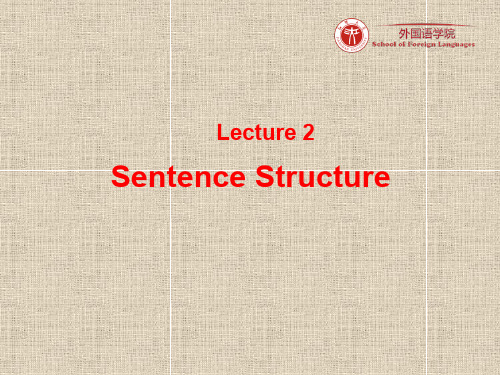
consent, desisted.
C1 Simple Sentence
SV
O
I know of many cases
where
Complex Clause
2. To divide the predicate into two parts: the operator and the
Thpe roepderiactaortion.
the auxiliary or the first auxiliary in a complex verb phrase The predication the main verb with its complementation
Innumerable authentic sentences are structured on the basis of these clause types.
1) Basic Clause Types
• The seven basic clause types
arSeV: C
SV SVA
2) Two Ways of Sentence
Analysis
1. To divide the predicate into predicate verb(incl:auxiliary), object, complement and adverbial. These elements together with the subject make the five cFlaivuesCelaeulseemEleenmtesn.ts
新编英语教程5_unit1_教学课件
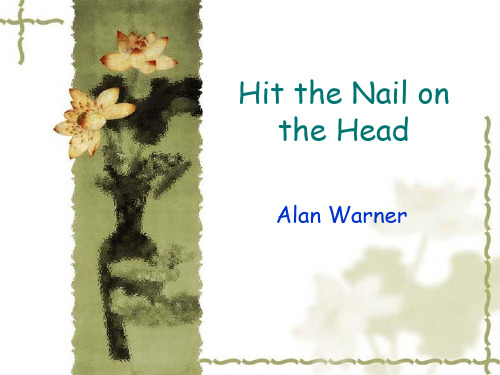
Alan Warner
I. Pre-reading Questions
Have you ever hit a nail into a box? What‟s the correct way of doing it? Can you see the connection between the proverb and our writing?
III. Organization of the Text
1. An analogy between the unskilled use of the hammer and the improper choice of words (Paragraph 1) 2. The significance of finding the right words (Paragraphs 2 --- 3)
3. Semantic differences between words having the same root (Paragraphs 4 --- 7) (1). Example 1 (human vs. humane) (Paragraph 4) (2). Example 2 (anxiety vs. eagerness) (Paragraph 5) (3). Example 3 (singularity vs. singleness) (Paragraphs 6 – 7)
The author advises that the English students should try to get the words, phrases and sentences completely right for their purposes in their writing.
新编英语语法教程PPT课件
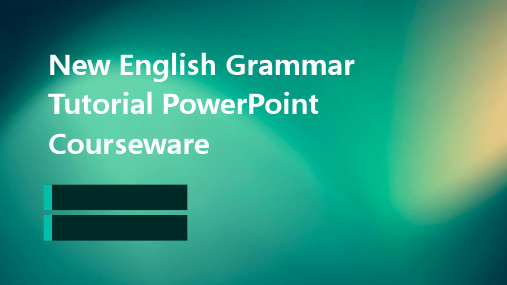
a word or phrase that describes or limits the meaning of another word in a sense
Sense and voice
Sense
indicates when an action or state occurs (past, present, or future)
Introduce clauses that modify nouns or pronouns (e.g., "who," "which," "that")
Used to ask questions about nouns or pronouns (e.g., "who," "what," "which")
Voice
indicates which subject of the presence performs the action (active voice) or receives the action (passive voice)
Subjunctive mood
Subjunctive mood
03 Nouns and Pronouns
Types and Usage of Nouns
Generic names for people, places, or things (e.g., "dog,"
"city")
Co mm on No uns
Refer to ideas, concepts, or qualities
Background
英语语法教程1.A brief account of the English sentence structures
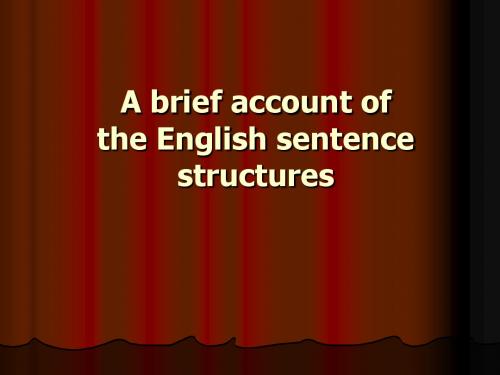
C) The modifying elements include attributives and adverbials. Adjectives, nouns and pronouns can all be attributives, but only adverbs can be used as adverbials. D) Non-finite verbs including infinitives, -ing participle and -ed participle, not only have the features of the verb but can also demonstrate the characteristics of the noun, or the adjective, or the adverb. E) Prepositions, determiners and conjunctions are all “structure words”, also called “form words”, because they are not used alone to form sentence elements, instead, they collocate with the noun or the verb to form phrases and function as sentence elements, the “noun phrase” and the “verb phrase” in particular.
1.5 Sentence elements and classes of words
A) Sentence elements can be classified into principal elements, related elements and modifying elements. The principal elements refer to the subject and predicate verb, with nouns and pronouns working as the former, and with verbs as the latter. B) The related elements refer to the object and compliment. Nouns and pronouns can be used as the object, while nouns, pronouns, adjectives and adverbs can all be used as the compliment.
新编英语教程5.unit1知识点
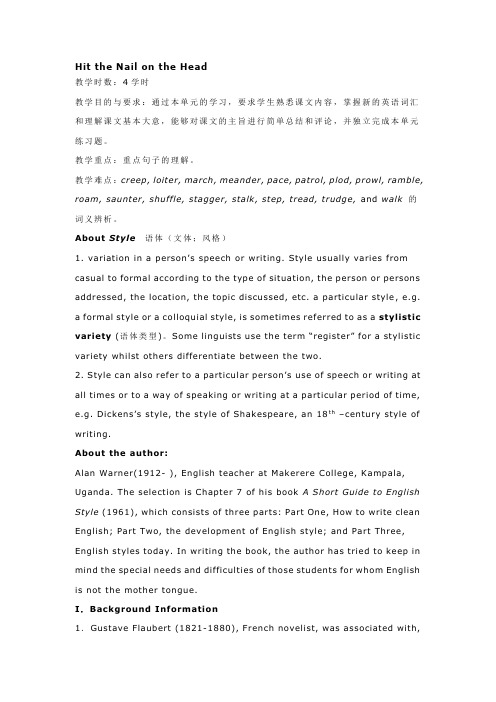
Hit the Nail on the Head教学时数:4学时教学目的与要求:通过本单元的学习,要求学生熟悉课文内容,掌握新的英语词汇和理解课文基本大意,能够对课文的主旨进行简单总结和评论,并独立完成本单元练习题。
教学重点:重点句子的理解。
教学难点:creep, loiter, march, meander, pace, patrol, plod, prowl, ramble, roam, saunter, shuffle, stagger, stalk, step, tread, trudge,and walk的词义辨析。
About Style语体(文体;风格)1. variation in a person‘s speech or writing. Style usually varies from casual to formal according to the type of situation, the person or persons addressed, the location, the topic discussed, etc. a particular style, e.g.a formal style or a colloquial style, is sometimes referred to as a stylistic variety (语体类型)。
Some linguists use the term ―register‖ for a stylistic variety whilst others differentiate between the two.2. Style can also refer to a particular person‘s use of speech or writing at all times or to a way of speaking or writing at a particular period of time, e.g. Dickens‘s style, the style of Shakespeare, an 18th–century style of writing.About the author:Alan Warner(1912- ), English teacher at Makerere College, Kampala, Uganda. The selection is Chapter 7 of his book A Short Guide to English Style (1961), which consists of three parts: Part One, How to write clean English; Part Two, the development of English style; and Part Three, English styles today. In writing the book, the author has tried to keep in mind the special needs and difficulties of those students for whom English is not the mother tongue.I.Background Information1.Gustave Flaubert (1821-1880), French novelist, was associated with,thought not representative of, the movement of naturalism and known as one of the greatest realists of nineteenth-century France. He devoted his life to long hours spent in heavy toil over his work. His writing is marked by exactness and accuracy of observation, e xtreme impersonality and objectivity of treatment, and precision and expressiveness in style, or the principle of the mot juste.2. Mrs. Malaprop is a famous character in Sheridan‘s comedy The Rivals (1775). She is noted for her blunders in the use of word s. ―As headstrong as an allegory (alligator) on the banks of the Nile‖ is one of her grotesque misapplications. She also requests that no delusions (allusions) to the past be made. She has given us the word malapropism as a name for such mistakes.(谢里丹Sheridan,Richard Brinsley, 英国剧作家,政治家。
SentenceStructure五种基本句型讲解
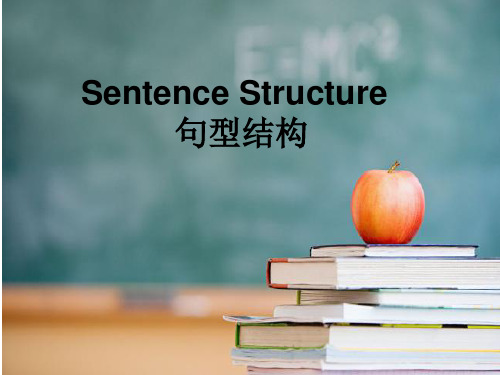
总结:
这种句型中的动词大多是不__及__物__动__词____动词, 这种动词后不可以_直__接__接__宾__语___。常见的动词 如:work, sing, swim, fish, jump, arrive, come, die, disappear, cry, happen等。
二、句型2:Subject (主语) + Link. V(系 动词) + Predicate(表语) 这种句型主要用来表示主语的特点、身份等。 其系动词一般可分为下列两类: (1)表示状态。这样的词有:be, look, seem, smell, taste, sound, keep,feel等。如:
5) I don’t know what I should do next.
总结:
这种句型中的动词一般为__及__物____动词,
这种动词后可以_直__接__加___宾__语__,其宾语
名词、代词、动词不 通常由定___式__、__动__名___词__或__从__句___等来充当。
四、句型4: Subject(主语)+Verb(谓语) + Indirect object(间接宾语)+Direct object (直接宾语)
三、句型3:Subject(主语) + Verb (谓 语) + Object (宾语) 例:
1) He took his bag and left.
2) Li Lei always helps me .
3) She plans to travel in the coming May Day.
4) I like running.
Sentence Structure 句型结构
英语中的五种基本句型结构
一、句型1: Subject (主语) + Verb (谓语) 如: 1) Li Ming works very hard.
新编英语语法教程
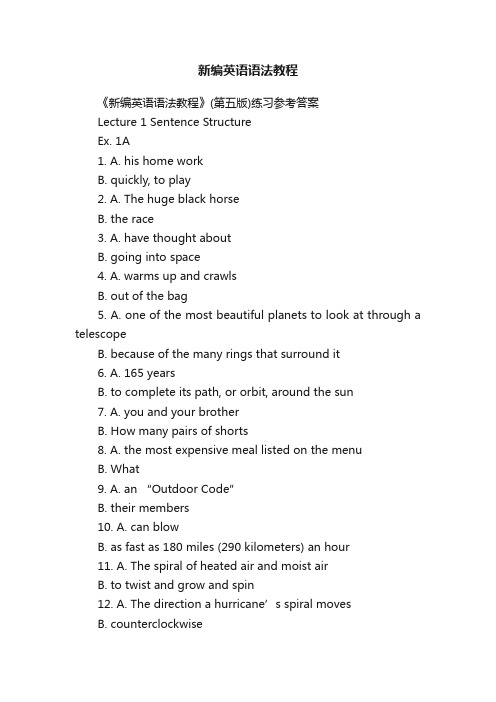
新编英语语法教程《新编英语语法教程》(第五版)练习参考答案Lecture 1 Sentence StructureEx. 1A1. A. his home workB. quickly, to play2. A. The huge black horseB. the race3. A. have thought aboutB. going into space4. A. warms up and crawlsB. out of the bag5. A. one of the most beautiful planets to look at through a telescopeB. because of the many rings that surround it6. A. 165 yearsB. to complete its path, or orbit, around the sun7. A. you and your brotherB. How many pairs of shorts8. A. the most expensive meal listed on the menuB. What9. A. an “Outdoor Code”B. their members10. A. can blowB. as fast as 180 miles (290 kilometers) an hour11. A. The spiral of heated air and moist airB. to twist and grow and spin12. A. The direction a hurricane’s spiral movesB. counterclockwise13. A. does not shineB. At the north pole; for half of the year14. A. The cold winds that blow off of the Arctic OceanB. a very cold place15. A. might have beenB. guilty of murderEx. 1B1. SVCWithin the stricken area, not a single soul remained alive, and the city centre looked as if it had been razed by monster steam-roller.2. SVThe bomb exploded 1,000 ft. above the ground.3. SVOOn August 6, 1945, an American aircraft dropped a bomb on the Japanese town of Hiroshima.4. SvoOThree days later, yet another bomb of the same kind gave the town of Nagasaki the same fatal blow.5. SVOCThe explosion made one and a half square miles of the city an expense of reddish rubble.6. SVAWithin the fraction of a second, the bomb changed from a metal cylinder into an immense mass of expanding gas, millions of degrees hot.7. SVOAA tremendous blast of hot air whirled the debris of stone, concrete, metal, and wood over the ground.Ex. 1C1. Walden Pond, once praised by Thoreau for its natural beauty, is now the site of many tourist stands.2. Almost every summer night the cooling northeast wind swept through our bedroom windows, marking air conditioning unnecessary and a light blanket welcome. / Sweeping through our bedroom windows almost every summer night, the cooling northeast wind made…3. The steep surrounding slopes were capped with snow, which fed two streams plunging down to join in the valley below.4. With the river on one side and a large tree providing shade, this is a good spot for a picnic, and we can spread our blanket on the grassy knoll.5. Panting for breath after running up the stairs, Mr wood stood at his neighbour’s door and knocked again and again till someone opened it.6. The town folk envied Horace, who had come into a small fortune with which he bought a big house and obtained a partnership in the biggest grocery in town.7. Standing in front of the mirror, Jim looked at his image, wondering at the big change that had come over him in recent years.8. The idea that his only daughter whom he had greatly wronged might never forgive him almost drove him mad.9. The story, written in plain language, consists of three parts with an interesting plot centering round an aristocratic family living in 17th century France.10. Mud-covered and shivering, John sat hunched over a bowl of hot broth prepared by his father to drive off the chill.11. Far above the waters of a beautiful lake and over the tops of the tall pine trees growing on the steep of a hill stand fiveChinese-style pavilions. 12. Farther down the street, the old man stopped and leaned against a lamp-post, listening to a cheerful song coming out of a restaurant on the opposite side of the street.13. Sarah sank in the nearest chair, completely exhausted, her limbs stiff with cold, her mind a piece of blank.14. Throughout the day Mrs Rymer behaved very properly, her pleasant, refined face wearing a grave look, her elegant figure wrapped in deep mourning while occasionally she uttered a sigh or a sob.15. Tony thought it necessary to break the news to his family, that Mr Jacob, his former employer, had promised him a half-day job at 20 pounds a week. 16. The thought that he might have wronged his friend who had rendered him good services on many occasions troubled his mind, already overburdened with worries and cares.17. The men of the disbanded royal bodyguard, suddenly turned loose onto the street of a capital seething with unrest, unemployed and perhaps disgruntled at their abrupt dismissal, were a potentially dangerous element.18. For many years London has been a business centre with hotel accommodation for visiting businessmen together with well-to-do travellers but completely inadequate for the swarms of shout-stay tourists landing at Heathrow or disembarking at Dover.19. Nearing the top, he climbed recklessly faster and faster, his eyes already glowing with triumph, but suddenly he slipped and fell, tumbling to the ground and lying motionless there, a crumpled pile of arms and legs.20. Bertrand Russell was one of the very few persons whohave received both the Order of Merit, which was conferred on him by the British government in 1949, and the Nobel Prize for literature, conferred in Norway in 1950.Lecture 2 Subject-verb Concord (I)Ex. 2A1. come2. are3. has / have4. are5. are6. are7. was / were8. is9. costs 10. were 11. are 12. are 13. was 14. are 15. lie 16. were 17. are 18. is 19. is 20. was 21. Has 22. were 23. is 24. is 25. are 26. is 27. are 28. cover, are 29. is / are 30. was/wereEx. 2B1. were2. have3. is, is4. was5. were6. is7. is8. are9. is 10. are, are11. have 12. are, their, their 13. was, It, was 14, It / They, is / are 15. are, their, they, disapprove 16. were, they 17. was 18. are 19. were 20. wereLecture 3 Subject-verb Concord (II)1. is2. was3. is4. has5. were6. means7. is8. is9. is 10. is 11. were 12. sells 13. is 14. are 15. are 16. are 17. is 18. is 19. was 20.provides 21. are 22. was 23. stops 24. is 25. is 26. does 27. produces 28. is 29. is 30. wasEx. 3B1. ’s2. are3. is4. are5. is6. was7. is8. were9. is 10. ’s 11. is 12. is, is, is 13. are 14. is 15. have 16. is 17. are 18. looks 19. are 20. are 21. understand 22. has 23. was 24. have 25. was 26. was 27. are 28. is 29. is 30. was 31. is 32. is / are 33. leaves 34. is / are 35. are 36. are 37. is 38. comes 39. is 40. live 41. are 42. points / point 43. are 44. is 45. are 46. was 47. is / are 48. is 49. has 50. wasEx. 3C1. is / are2. is / are4. is / are5. is / are6. remain7. is8. are9. has / have 10.care / cares 11. is 12. plays 13. is 14. am 15. are / is 16. was 17. is, has 18. was 19. come 20. isLecture 4 Noun and Noun PhraseEx. 4A1. description2. arrangement3. attendance4. peculiarity5. expectation6. argument7. dependence8. originality9. exaggeration 10. measurement 11. purity 12. persistence 13. extension 14. statement 15. generosity 16. entrance 17. loneliness 18. forgetfulness 19. happiness 20. seriousness Ex. 4B1. strange sounds2. foods are3. chief, tribes, their, salmon (s)4. The runners-up were given pound notes / The runners-up were each given a pound note.5. bodies, their heroes6. mice, tooth-marks7. Crises, occur, families9. / 10. these businesses 11. / 12. fruits are 13. / 14. these articles are well written 15. / 16. several personal kindnesses 17. / 18. sufferings 19. professors 20. children are playing, sands Ex. 4C1. experience2. waters3. for advice4. an important piece of information5. for it is fun6. were not numerous7. Poultry8. directors are9. militia 10. geniuses 11. merchandise has 12. sympathies13. experiences 14. were times, rivalry 15. clippings, were 16. lookers-on 17. foliage is 18. photos 19. 12-pages 20. Luggage is Ex. 4D1. blade2. piece3. choir4. flash5. lump6. gang7. grain8. head9. staff 10. collection 11. fleet 12. cluster 13. bundle 14. bunch 15. team 16. piece 17. ear 18. bar 19. herd 20. pack 21. flock 22. crowd / swarm 23. troupe 24. bench 25. grove 26. collection 27. suite 28. squadron 29. band 30. libraryEx. 4E2. C3. A4. D5. C6. C7. B8. D9. A 10. B 11. A 12. D 13. B 14. B 15. C 16. B 17. D 18. C 19. A 20. BLecture 5 Genitive NounEx. 5A1. my father has a car2. the bull has horns3. the prisoner escaped4. her parents consented5. somebody released the prisoner6. somebody assassinated the President7. a letter from the general / the general sent a letter8. the crowd felt sympathy9. a college for women10. a summer day, a day in the summer11. the earth has a (rough) surface12. the absence lasted ten days13. a doctoral degree, a doctorate14. the bird made the nest15. the committee made a report16. a story told by the girl / the girl told a story17. the volcano erupted18. the victim had courage / the victim was courageous19. somebody punished the boy20. the critics received the play in a hostile mannerEx. 5B1. The comedian performed, and he was well received by a huge audience.这位喜剧演员的演出很受广大观众的欢迎。
Sentence Structure 五种基本句型
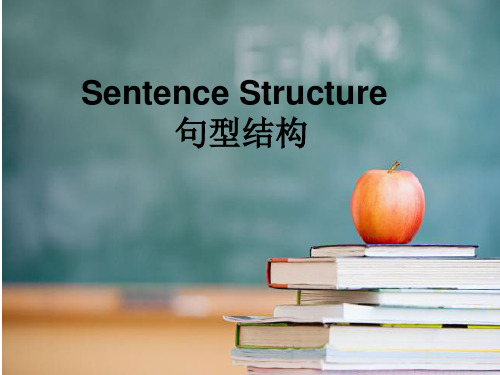
They built a house last year. 他们去年建了一所房子。 They‘ve put up a factory in the village. 他们在村里建了一座工厂。 They have taken good care of the children. 这些孩子他们照看得很好。 You should look after your children well. 你应该好好照看你的孩子。
1) The story sounds interesting. 2) He looked worried just now.
(2)表示变化。
这类系动词有:become, turn, get, grow, go等。如:
1) You have grown taller than before. 2) He has suddenly fallen ill.
五个基本句式详细解释如下: 1.S十V句式 在此句式中,V是不及物动词,又叫自动 词(vi.)。
He runs quickly. 他跑得快。 They listened carefully. 他们听得很仔细。 He suffered from cold and hunger. 他挨冻受饿。 China belongs to the third world country. 中国属于第三世界国家。 The gas has given out. 煤气用完了。 My ink has run out. 我的钢笔水用完了。
They grow rice in their home town. 他们在家乡种水稻。 He‘s got a chair to sit on. 他有椅子坐。 Please turn the sentence into English. 请把这个句于泽成英语。
新编英语语法教程1-18讲参考答案---上外第五版

《新编英语语法教程》1-18讲参考答案新编英语语法教程第01讲练习参考答案Ex. 1A1. A. his home workB. quickly, to play2. A. The huge black horseB. the race3. A. have thought aboutB. going into space4. A. warms up and crawlsB. out of the bag5. A. one of the most beautiful planets to look at through a telescopeB. because of the many rings that surround it6. A. 165 yearsB. to complete its path, or orbit,around the sun7. A. you and your brotherB. How many pairs of shorts8. A. the most expensive meal listed on the menuB. What9. A. an “Outdoor Code”B. their members10. A. can blowB. as fast as 180 miles (290 kilometers) an hour11. A. The spiral of heated air and moist airB. to twist and grow and spin12. A. The direction a hu rricane’s spiral movesB. counterclockwise13. A. does not shineB. At the north pole: for half of the year14. A. The cold winds that blow off of the Arctic OceanB. a very cold place15. A. might have beenB. guilty of murderEx. 1B1. SVCWithin the stricken area, not a single soul remained alive, and the city centre looked as if it had been razed by monster steam-roller.2. SVThe bomb exploded 1,000 ft. above the groun.3. SVOOn August 6, 1945, an American aircraft dropped a bomb on the Janpanese town of Hiroshima.4. SvoOThree days later, yet another bomb of the same kind gave the town of Nagasaki the same fatal blow.5. SVOCThe explosion made one and a half square miles of the city an expense of reddish rubble.6. SV AWithin the fraction of a second, the bomb changed from a metal cylinder into an immense mass of enpanding gas, millions of degrees hot.7. SVOAA tremendous blast of hot air whirled the debris of stone, cencrete, metal, and wood over the ground. Ex. 1C1. Walden Pond, once praised by Thoreau for its natural beauty, is now the site of many tourist stands.2. Almost every summer night the cooling northeast wind swept through our bedroom windows, marking air conditioning unnecessary and a light blanket welcome. / Swepping through our bedroom windows almost every summer night, the cooling northeast wind made…3. The steep surrounding slopes were capped with snow, which fed two streams plunging down to join in the valley below.4. With the river on one side and a large tree providing shade, this is a good spot for a picnic, and we can spread our blanket on the grassy knoll.5. Panting for breath after running up the stairs, Mr wood stood at his neighbour’s doo r and knocked again and again till someone opened it.6. The town folk envied horace, who had come into a small fortune with which he bought a big house and obtained a partnership in the biggest grocery in town.7. Standing in front of the mirror, Jim looked at his image, wondering at the big change that had come over him in recent years.8. The idea that his only daughter whom he had greatly wronged might never forgive him almost drove hime mad.9. The story, written in plain language, consists of three parts with an interesting plot centering round an aristocratic family living in 17th century France.10. Mud-covered and shivering, John sat hunched over a bowl of hot broth prepared by his father to drive off the chill.11. Far above the waters of a beautiful lake and over the tops of the tall pime trees growing on the steep ofa hill stand five Chinese-style pavilions.12. Farther down the street, the old man stopped and leaned against a lamp-post, listening to a cheerful song coming out of a restaurant on the oppsite side of the street.13. Sarah sank in the nearest chair, completely exhausted, her limbs stiff with cold, her mind a piece of blank.14. Throughout the day Mrs Rymer behaved very properly, her pleasant, refined face wearing a grave look, her elegant figure wrapped in deep mourning while occasionally she uttered a sigh or a sob.15. Tony thought it necessary to break the news to his family, that Mr Jacob, his former employer, had promised him a half-day job at 20 pounds a week. 16. The thought that he might have wronged his friend who had rendered him good services on many occasions troubled his mind, already overburdened with worries and cares.17. The men of the disbanded royal bodyguard, suddenly turned loose onto the street of a capital seething with unrest, unemployed and perhaps disgruntled at their abrupt dismissal, were a potentially dangerous element.18. For many years London has been a business centre with hotel accommadation for visiting businessmen toghter with well-to-do travellers but completely inadequate for the swarms of shour-stay tourists landing at Heathrow or disembarking at Dover.19. Nearing the top, he climbed recklessly faser and faster, his eyes already glowing with triumph, but suddenly he slipped and fell, tumbling to the ground and lying motionless there, a crumpled pile of arms and legs.20. Bertrand Russell was one of the very few persons who have received both the Order of Merit, which was conferred on him by the British government in 1949, and the Nobel Prize for literature, conferred in Norway in 1950.新编英语语法教程第02讲练习参考答案Ex. 2A1. come2. are3. has / have4. are5. are6. are7. was / were8. is9. costs 10. were 11. are 12. are 13. was 14. are 15. lie 16. were 17. are 18. is 19. is 20. was 21. Has 22. were 23. is 24. is 25. are 26. is 27. are 28. cover, are 29. is / are 30. was/wereEx. 2B1. were2. have3. is, is4. was5. were6. is7. is8. are9. is 10. are, are11. have 12. are, their, their 13. was, It, was 14, It / They, is / are 15. are, their, they, disapprove 16. were, they 17. was 18. are 19. were 20. were新编英语语法教程第03讲练习参考答案Ex. 3A1. is2. was3. is4. has5. were6. means7. is8. is9. is 10. is 11. were 12. sells 13. is 14. are 15. are 16. are 17. is 18. is 19. was 20.provides 21. are 22. was 23. stops 24. is 25. is 26. does 27. produces 28. is 29. is 30. was Ex. 3B1. ’s2. are3. is4. are5. is6. was7. is8. were9. is 10. ’s 11. is 12. is, is, is 13. are 14. is 15. have 16. is 17. are 18. looks 19. are 20. are 21. understand 22. has 23. was 24. have 25. was 26. was 27. are 28. is 29. is 30. was 31. is 32. is / are 33. leaves 34. is / are 35. are 36. are 37. is 38. comes 39. is 40. live 41. are 42. points / point 43. are 44. is 45. are 46. was 47. is / are 48. is 49. has 50. wasEx. 3C1. is / are2. is / are3. is4. is / are5. is / are6. remain7. is8. are9. has / have 10.care / cares 11. is 12. plays 13. is 14. am 15. are / is 16. was 17. is, has 18. was 19. come 20. is新编英语语法教程第04讲练习参考答案Ex. 4A1. description2. arrangement3. attendance4. peculiarity5. expectation6. argument7. dependence 8. originality 9. exaggeration10. measurement 11. purity 12. persistence 13. extension 14. statement 15. generosity 16. entrance 17. loneliness18. forgetfulness 19. happiness 20. seriousness Ex. 4B1. strange sounds2. foods are3. chief, tribes, their, salmon (s)4. The runners-up were given pound notes / The runners-up were each given a pound note.5. bodies, their heroes6. mice, tooth-marks7. Crises, occur, families8. / 9. / 10. these businesses 11. / 12. fruits are13. / 14. these articles are well written 15. / 16. several personal kindnesses17. / 18. sufferings 19. professors 20. children are playing, sandsEx. 4C1. experience2. waters3. for advice4. an important piece of information5. for it is fun6. were not numerous7. Poultry8. directors are9. militia 10. geniuses 11. merchandise has 12. sympathies 13. experiences 14. were times, rivalry 15. clippings, were 16. lookers-on 17. foliage is 18. photos 19. 12-pages 20. Luggage isEx. 4D1. blade2. piece3. choir4. flash5. lump6. gang7. grain8. head9. staff 10. collection 11. fleet 12. cluster 13. bundle 14. bunch 15. team 16. piece 17. ear 18. bar 19. herd 20. pack 21. flock 22. crowd / swarm 23. troupe 24. bench 25. grove 26. collection 27. suite 28. squadron 29. band 30. libraryEx. 4E1-5 BCADC 6-10 CBDAB 11-15 ADBBC 16-20 BDCAB新编英语语法教程第05讲练习参考答案Ex. 5A1. my father has a car2. the bull has horns3. the prisoner escaped4. her parents consented5. somebody released the prisoner6. somebody assassinated the President7. a letter from the general / the general sent a letter8. the crowd felt sympathy9. a college for women10. a summer day, a day in the summer11. the earth has a (rough) surface12. the absence lasted ten days13. a doctoral degree, a doctorate14. the bird made the nest15. the committee made a report16. a story told by the girl / the girl told a story17. the volcano erupted18. the victim had courage / the victim was courageous19. somebody punished the boy20. the critics recevied the play in a hostile manner Ex. 5B1. The comedian performed, and he was well received by a huge audience.这位喜剧演员的演出很受广大观众的欢迎。
新编英语语法教程第五版1 Sentence Structure
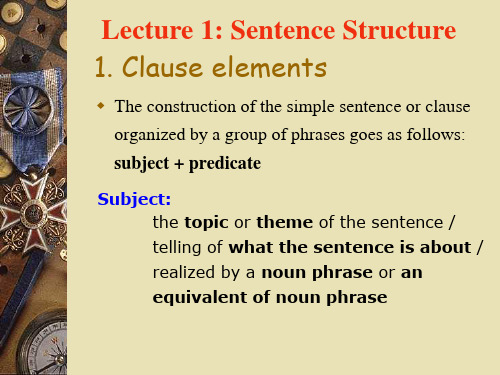
Practice
(2014-TEM4) 53. Which of the following italicized parts is used as an object complement? A. The front door remained locked. B. The boy looked disappointed. C. Nancy appeared worried. D. He seemed to have no money left.
(2011-TEM4) 58. Which of the following italicized parts is used as an object? A. What do you think has happened to her? B. Who do you think the visiting professor is? C. How much do you think he earns every month? D. How quickly would you say he would come? (2010-TEM4) 61. In the sentence "It's no use waiting for her", the italicized phrase is ____. A. the object B. an adverbial C. a complement D. the subject
Lecture 1: Sentence Structure 1. Clause elements
The construction of the simple sentence or clause
英语语法1句型结构
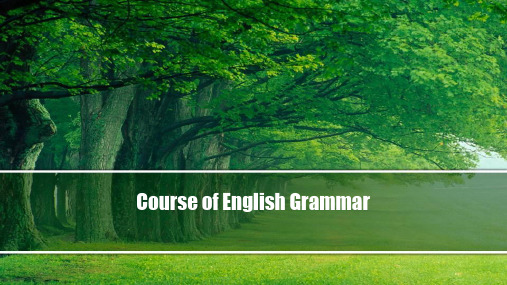
在剖析谓语的构成时,本教材采用两种分析法:一是把谓语剖析为 “谓语动词”、“宾语”、“补语”、“状语”,并和“主语”一 起得出主、动、宾、补等五个主要的、由词组表示的分局成分;另 一种是把谓语剖析为“操作词+述谓成分”。
1.2 Basic clause types and their transformation and expansion
Lecture 1 Sentence Structure
1.1 Clause elements
1) Subject and predicate The subject is the topic or theme of the sentence, which tells of what the sentence is about. The predicate says something about the subject and bears the new information which the speaker or writer wants to transmit to the listener or reader.
Sentence
1. Simple sentence e.g. The students have made better grades in the past few weeks. The students I teach have made better grades in the past few weeks. 2. Compound sentence e.g. The students would have made better grades if they had studied harder. What he said is not true. 3. Complex sentence Miss London came to the party, but Mr. and Mrs. Green did not. They watched television and enjoyed themselves immensely, but we couldn't see the program because our television was broken.
最新《新编英语语法教程》主要章节语法术语

* (2) Classification in terms of grammatical functionNoun phrase Verb phraseAdjective phrase Adverb phrase Preposition phraseConjunction(1) I ndependent clause & Subordinate clause独立分句和从属分句(2) S imple clause & Complex clause (*complex sentence)简单分句和复杂分句(*复杂句)(3) M ain clause & Subordinate clause主句和从句(4) F inite clause, non-finite clause and Verbless clause限定分句、非限定分句、无动词分句(1) Full sentence &Minor sentence 完全句和不完全句(2)Simple sentence, Compound sentence, Complex sentence & Compound complex sentence 简单句、并列句、复杂句、并列复杂句(3)Declarative sentence, imperative sentence, interrogative sentence, exclamatory sentence《新编英语语法教程》主要章节语法术语Introduction: Grammatical Hierarchy (导论一语法层次)1. Morpheme词素Free morpheme 自 由词素 Bound morpheme 粘附词素 j Allomorph 词素变体 2. Parts of speech (word class) Simple words 简单词 Derivatives 派生词Compounds 复合词 *(1) Classification in terms of word formationOpen-class words (content words)开放词类(实义词)NounVerb Adjective AdverbClosed-class words (function words封闭词类(功能词)Preposition PronounDeterminer Conjunction AuxiliaryIntermediate class(中间词类)NumeralsInterjection3. Phrases词组4. Clause分句5. Sentence句子Lecture 1 Sentence Structure ( L1 )Sentence elements: S (subject)V (predicate verb)O (object)主语 谓语动词 宾语1. Two ways of sentence analysis 1) SVOSentence ClauseSentence = Subject + Predicate (Predicate Verb + Object, Complement, Adverbial, etc.)句子由主语和谓语构成,进一步把谓语剖析为谓语动词、宾语、补语、状语等。
新编英语语法教程 第5版 学生用书答案

定语从句
(形容词性从句)
Chapters 35–38
Speech Modification Substitution
Chapter 39
Fronting / Inversion
SAT
教育哲学
Final paper
英语写作
Essay3
Verbs
English Tense Table
Chapters 14-15
Passiive Mood
Chapters 17-18
Auxiliary助动词
Chapters 19-21
非谓语动词
Three Forms of Non-verbs(1)
EX: 19 ABCD; EX 20 BDE-a; EX 21 ABCDE;
EX. 22 ABCD;
EX 32 ABDE
Extra exercises
EX. 23 BCD,
EX 24, ABD
EX.39 B
章节Chapter
内容
Introduction
Chapter 1
Course description
Sentence structure
句子结构
Chapters 2-3
Subject-verb Concord
主谓一致
Chapters 4-5
Noun and Genitive Noun
名词与属格
Chapter 6-7
Determiners
限定词
Chapters 8-9
Pronouns
Chapters 10-13
Chapters 22,32
Three Forms of Non-verbs(2)
新编英语语法教程(第五册)it-patterns
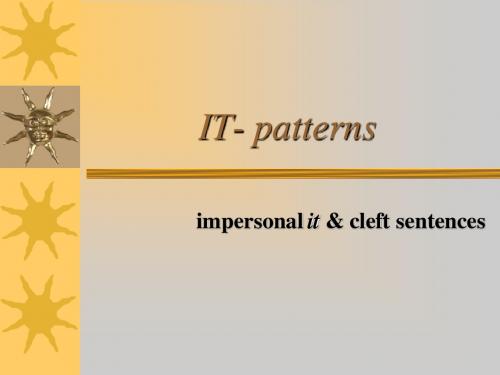
Commenting on an action, activity or experience
1) be or other linking v. • It’s fun working for him • It’s nice to see you. • It becomes hard for a student to find some spare time. • It’s important to know your limitations.
2) other kinds of focus • Time or place • It was from Francis that she first heard the news. • It was then that I recalled that I had left my coat in the saloon. • It was in London that I first saw these films.
IT- patterns
impersonal it & cleft sentences
Impersonal ‘it’
• Taking the focus off the subject
• • • • It’s lonely here. It had been raining all day. It is seven o’clock. It costs so much to get there.
Commenting on a fact that you’re about to mention
1) It + linking v. + C. (adj. or n.)+ that… • It’s strange that he didn’t show up. • It’s a shame that they didn’t come. adj.: amazing/essential/inevitable/apparent/ awful/fair/queer/odd n.: disgrace/shame/nuisance/wonder/pity/ marbing a place or situation
新编英语语法教程(第5版)答案

新编英语语法教程(第5版)答案第一篇:新编英语语法教程(第5版)答案《新编英语语法教程》答案Ex.1A1.A.his home workB.quickly, to play 2.A.The huge black horseB.the race3.A.have thought aboutB.going into space4.A.warms up and crawlsB.out of the bag5.A.one of the most beautiful planets to look atthrough a telescopeB.because of the many rings that surround it 6.A.165 yearsB.to complete its path, or orbit,around the sun 7.A.you and your brotherB.How many pairs of shorts8.A.the most expensive meal listed on the menuB.What9.A.an ―Outdoor Code‖B.their members 10.A.can blowB.as fast as 180 miles(290 kilometers)an hour 11.A.The spiral of heated air and moist airB.to twist and grow and spin12.A.The direction a hurricane‘s spiral moves B.counterclockwise 13.A.does not shineB.At the north pole: for half of the year14.A.The cold winds that blow off of the Arctic OceanB.a very cold place 15.A.might have beenB.guilty of murder Ex.1B1.SVCWithin the stricken area, not a single soul remained alive, and the city centre looked as if it had been razed by monster steam-roller.2.SVThe bomb exploded 1,000 ft.above the groun.3.SVOOn August 6,1945, an American aircraft dropped a bomb on the Janpanese town of Hiroshima.4.SvoOThree days later, yet another bomb of the same kind gave the town of Nagasaki the same fatal blow.5.SVOCThe explosion made one and a half square miles of the city an expense of reddish rubble.6.SVAWithin the fraction of a second, the bomb changedfrom a metal cylinder into an immense mass of enpanding gas, millions of degrees hot.7.SVOAA tremendous blast of hot air whirled the debris of stone, cencrete, metal, and wood over the ground.Ex.1C1.Walden Pond, once praised by Thoreau for its natural beauty, is now the site of many tourist stands.2.Almost every summer night the cooling northeast wind swept through our bedroom windows, marking air conditioning unnecessary and a light blanket welcome./ Swepping through our bedroom windows almost every summer night, the cooling northeast wind ma de…3.The steep surrounding slopes were capped with snow, which fed two streams plunging down to join in the valley below.4.With the river on one side and a large tree providing shade,this is a good spot for a picnic, and we can spread our blanket on the grassy knoll.5.Panting for breath after running up the stairs, Mr wood stood at his neighbour‘s door and knocked again and again till someone opened it.6.The town folk envied horace, who had come into a small fortune with which he bought a big house and obtained a partnership in the biggest grocery in town.7.Standing in front of the mirror, Jim looked at his image, wondering at the big change that had come over him in recent years.8.The idea that his only daughter whom he had greatly wronged might never forgive him almost drove hime mad.第二篇:新编英语语法教程(第5版)chapter2~3新编英语语法教程第02讲练习参考答案Ex.2Ae2.are3.has / have4.are5.are6.are7.was / were8.is9.costs10.were11.are12.are13.was14.are15.lie16.were17.a re18.is19.is20.was21.Has22.were23.is24.is25.are26.is27.are28.cover, are29.is / are30.was/wereEx.2B1.were2.have3.is, is4.was5.were6.is7.is8.are9.is10.are, are11.have12.are, their, their13.was, It, was14, It / They, is / are15.are, their, they, disapprove16.were, they17.was18.are19.were20.were新编英语语法教程第03讲练习参考答案Ex.3A1.is2.was3.is4.has5.were6.means7.is8.is9.is10.is11.were12.sells13.is14.are15.are16.are17.is18.is19.was20.provides21.are22.was23.stops24.is25.is26.does27.produces28.is29.is30.wasEx.3B1.’s2.are3.is4.are5.is6.was7.is8.were9.is10.’s11.is12.i s, is, is13.are14.is15.have16.is17.are18.looks19.are20.are21.understan d22.has23.was24.have25.was26.was27.are28.is29.is30.was31.is32.is / are33.leaves34.is / es39.is40.live41.are42.points / point43.are44.is45.are46.was47.is / are48.is49.has50.wasEx.3C1.is / are2.is / are3.is4.is / are5.is / are6.remain7.is8.are9.has / have10.care / cares11.is12.plays13.is14.am15.are / is16.was17.is, e20.is第三篇:新编英语语法教程教案第一章Teaching NotesChapter One The Hierarchical Structure o f Grammar ⅠTeaching Aims:This chapter aims to: 1.help students to know the hierachial structure of English grammar.2.get students to learn morphemes words, phrases and sentences and their classification.Ⅱ Teaching Procedures 1.Introduction The grammatical structure of English is a hierarchical one, which can be divided into five levels, i.e.Sentence, Clause, Phrase, Word and Morpheme.A sentence is the largest unit and highest level in a grammatical structure while a morpheme is the smallest and lowest one.2.Morphemes A morpheme is the smallest unit in English grammar, and also the smallest meaningful unit of language.1)Free Morphemes Free morphemes are morphemes which can constitute words by themselves, e.g.boy, girl, work, water.2)Bound Morphemes Some morphemes like de-, dis-,-ness,-ly are never used independently in speech and writing.They are always attached to free morphemes to form new words.These morphemes are called bound morphemes.Bound morphemes are mostly affixes.Affixes are attached to free morphemes either to form new words or to indicate grammatical categories.Affixes can be divided into two types: prefixes and suffixes.3.Words 1)Simple Word, Derivative, Compound Word a)simple words(morpheme words):at, far, hand, get b)derivatives: prefixes: dislike, unhappy, pronoun, prewar suffixes: worker, widen, foolish, manly c)compound words: handbook, outline, moreover, anybody 2)According to grammatical function, English words can be classified into Closed Class and Open Class.a)Closed Class Closed class refers to all the Function words.The number of this type of words are limited.No new comers will enter into this class.Therefore, this kind of words are called Closed Class.They include:Preposition: in, on, withoutPronoun: you, he, one, thisDeterminer: a, the, his, that, someConjunction: and, or, but, whenAuxiliary: do, can, must, will b)Open Class Open class refers to all the Content Words.In this type of words, new words appear continuously.Therefore, they are called Open Class.They included: Noun: Smith, Paris, man, book Adjective: old, big, cheap Adverb: here, fast, early Main Verb: work, make, give 4.Phrases A phrase is a grammatical unit which is formed by one word or more than one word.A phrase is usually a string of words built up around a head word which determines both the class that the phrase belongs to and the way the phrase is structured.Noun Phrase(N P):all the college students the tall boy sitting there Verb Phrase(V P):looks pale arrived last night Adjective Phrase(Adj P): very difficult careful enough Adverb Phrase(Adv P):very clearlyso slowly Preposition Phrase(P.P):before the war in the north 5.Clauses In logical terms, a clause is a construction of a subject and a predicate.In view of grammatical relations, clauses are divided into two broad categories, the main clause and the subordinate clause, the latter of which may function as a nominal clause, a relative clause, or an adverbial clause.1)Nominal clauses He said that he had done his best.What he said was true.2)Relative clauses This is one of the best films I’ve ever seen.He failed to pass the test, which was a pity.3)Adverbial clauses If I were you, I would not quit.I was having dinner when he came.6.Sentences In terms of sentence structure, sentences can be classified into three kinds:(1)simplesentences,(2)compound sentences and(3)complex sentences.(1)You throw a stone at the window.I’ll scream.(two simple sentences)(2)You throw a stone at the window and I’ll scream.(two coordinate main clauses in one sentence).(3)If you throw a stone at the window, I’ll scream.(one main clause and one subordinate clause within one and the same sentence)第四篇:新编应用文教程答案新编应用写作教程期末试卷答案一、单项选择题:1、D2、C3、A4、C5、C6、A7、B8、C9、A10、C二、多项选择题:1、ABC2、AC3、ABCD4、ABCD5、CD6、BC7、ABC8、ABCD三、简答题:1、应用文有那些特点?举例说明。
- 1、下载文档前请自行甄别文档内容的完整性,平台不提供额外的编辑、内容补充、找答案等附加服务。
- 2、"仅部分预览"的文档,不可在线预览部分如存在完整性等问题,可反馈申请退款(可完整预览的文档不适用该条件!)。
- 3、如文档侵犯您的权益,请联系客服反馈,我们会尽快为您处理(人工客服工作时间:9:00-18:30)。
The subject is the topic or theme of the sentence, which tells of what the sentence is about. And it is generally realized by a noun phrase or an equivalent of noun phrases. The predicate says something about the subject and bears the new information which the speaker or writer wants to transmit to the listener or reader.
Linking / Copular verbs: a. current copular verb: describe a state. e.g. be, feel, smell, taste, stay, look, keep, sound, appear
b. resulting copular verb: denote a change of state e.g. become, come, fall, go, get, grow, turn, prove
Lecture 1 Sentence Structure
Teaching Contents
1.1. Clause elements
1.2. Basic clause types and their transformation and expansion
Owing to the various sentence structures in a language, what is described here as sentence structure, sentence elements, or sentence patters is only concerned with the simple sentence or rather with the clause. 1.1. Clause elements The clause or the simple sentence is structurally a sequence of phrases and logically a construction of "subject + predicate". 1) Subject and predicate
A: modifications --- Last Saturday, an old woman worker told the students the bitter story of her childhood. B: coordination and subordination --- Most us were in the hall, the doors had been closed and later comers had to wait outside. --- You can call him what you like, but you won’t make him what he isn’t.
E. SVOC subj. + complex transitive verb + object + complement The relationship between the object and complement can be paraphrased with either “be” or “become”. e.g. She found it cold here. =…that it was cold here. The Airport Operators Council re-elected him president. F. SVA Subj. + V. + Adverbial e.g. I live in Beijing.
2) Two ways of sentence analysis a. subject + predicate: Predicate verb + Object + Complement + Adverbial Nhomakorabea
b. subject + predicate: Operator (the auxiliary or the first auxiliary in a complex verb phrase) + Predication
B. SV subj. + intransitive verb e.g. Iron rusts. Everybody laughs. C. SVO subj. +(mono)transitive verb + object e.g. I want a return ticket.
D. SVOO Double Object / Ditransitive Construction (DOC) subj. + ditransitive verb (give, send, teach, show, tell…) + indirect object (IO) + direct object (DO) e.g. I gave *(John) a book. Someone left (you) this note.
2) Transformation and expansion of basic clause types The basic clause types are all affirmative statements with verbs in the active voice. An affirmative one can be transformed into a negative; a statement into a question; and an active into a passive; all these add varieties to the basic clause types. They can also be expanded into larger grammatical units through adding modifiers.
G. SVOA subj. + transitive verb + object + obligatory adverbial e.g. Put / place a note on my door. The adverbial in the SVOA pattern most typically expresses location. It differs from ordinary locative adverbials in that it does not specify the circumstances of the action ‘placing’, ‘putting’, etc., but rather describes where the referent of the direct object ends up.
e.g. [All the men] [[have done] [their best]].
1.2. Basic clause types and their transformation and expansion 1) Basic clause types A. SVC subj. + linking verb + complement She is in good health. My brother has become an engineer.
